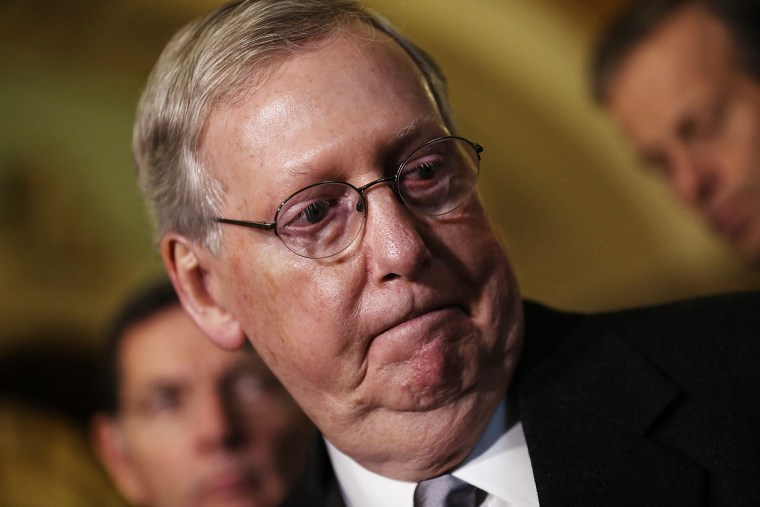The Congressional Budget Office's report on the Senate Republicans' health care plan was simply brutal. The GOP blueprint, Congress' non-partisan scorekeepers found, would take coverage from 22 million Americans, increase consumer costs, and make insurance worse.
Sen. John McCain (R-Ariz.), asked about the CBO's findings, told reporters on Capitol Hill late yesterday, "Well, obviously that's not good news."
The question now becomes what Senate Republicans intend to do about it. Sen. Dean Heller (R-Nev.) announced his opposition to the GOP legislation on Friday, and as of last night, as others joined him, GOP opposition appeared to reach a critical mass.
Sen. Susan Collins, R-Maine, announced via Twitter that the CBO report reaffirmed her fears about deep cuts to Medicaid in the Better Care Reconciliation Act and said she would vote against the "motion to proceed," a procedural vote that allows the Senate to bring up a piece of legislation to be debated and eventually voted on. [...]Sen. Rand Paul, R-Ky., also said he wouldn't vote for the motion to proceed, a vote expected to take place either Tuesday or Wednesday of this week.... Sen. Ron Johnson, R-Wis., is a third senator who said that he could vote against the procedural motion this week, saying he "would highly doubt" that he would support it.
Asked whether she would vote for her party's plan, Sen. Lisa Murkowski (R-Alaska) added last night that she's not in a position where she could "vote in the affirmative"
To pass the regressive bill, Senate Republican leaders can lose no more than two of their own members. At least for now, the tally appears to be well above two -- and the number of GOP opponents is growing, not shrinking.
And that leaves Senate Majority Leader Mitch McConnell (R-Ky.) with a limited number of options.
1. McConnell can hold the vote anyway. I don't doubt that McConnell wants to pass this monstrosity, but the GOP leader isn't delusional. If he counts heads, realizes he doesn't have the votes, and doesn't expect to get then, McConnell has the option of bringing his bill to the floor, watching it die, and then moving on to something else.
2. McConnell can punt. This week has been designated the make-or-break week for the Senate Republicans' health plan, but that's because of a self-imposed deadline. There's no reason McConnell can't do exactly what the GOP-led House did: pull the bill temporarily, allow for some behind-the-scenes negotiations to continue for weeks (or months), and revisit the issue at some point down the road. There's literally nothing -- substantive, procedural, etc. -- that says the vote has to be this week.
3. McConnell can start throwing money around. The CBO found that the Republican plan reduces the deficit by over $300 billion in the coming years. That effectively gives Senate GOP leaders a pot of money to play with, allocating it in such a way to curry favor with his skeptical members. Indeed, McConnell could even start applying the available money to take some of the rougher edges off his far-right proposal.
This third option carries some risks -- increasing spending would likely make this bill an even tougher pill for more conservative senators to swallow -- and the current Republican blueprint is so bad, there's a limit as to what $300 billion could do to mitigate its ill effects, but it's nevertheless an option McConnell is no doubt considering.
What's more, these options aren't necessarily mutually exclusive: it's easy to imagine McConnell agreeing to a temporary delay, for example, at which point he'd start throwing money around.
The road ahead should come into focus quite soon: the next procedural step -- the motion to proceed -- is expected to come to the Senate floor today or tomorrow.
